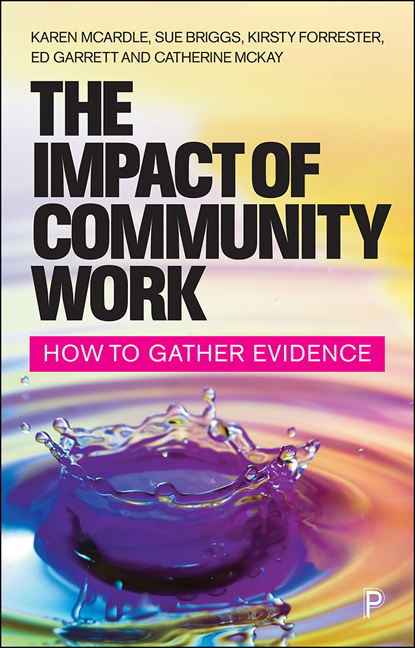Introduction
Published online by Cambridge University Press: 10 March 2021
Summary
‘Every action we take impacts the lives of others around us.’ (Arthur Carmazzi)
Being able to provide evidence of the value of what you do working in and with communities is clearly important for lots of good reasons that come quickly to mind. It can help secure funding and improve the long- term sustainability and profile of your work, as well as improving your own practice and keeping communities themselves informed of progress. It also can be used to meet the demands of funders, show value for money and improve effectiveness. We hope that this book is useful in these regards; it is intended to be a very practical resource for those who want to reflect on and improve how they provide evidence of what they do. The community is the focus of work for a very wide range of people – from volunteers to paid staff, in public, third and private sectors, from qualified community work professionals through to many others working in social care, health, education, planning, the arts and beyond and we all have an impact on those with whom we work.
It is important when thinking about impact to be aware that we want to show impact but the ways in which we do this themselves have an impact on our participants. This book not only concerns the methodology of generating evidence of impact, but also highlights the importance of ethical judgements about the ways in which we do this. Ethics is a theme that runs throughout this book, as the authors consider the judgements that we make about what has worked or what matters, for example, to be value judgements, which lie in the ethical domain. This is true for the judgements made by community workers but also the judgements made by the funders and decision makers who assess our evidence. Banks and colleagues (2013) refer to ethics in a practical context as ‘everyday ethics’, which is a term that stresses the situated nature of ethics, with a focus on qualities of character and responsibilities attaching to particular relationships, rather than ethics being a set of principles or rules.
- Type
- Chapter
- Information
- The Impact of Community WorkHow to Gather Evidence, pp. 1 - 6Publisher: Bristol University PressPrint publication year: 2020



